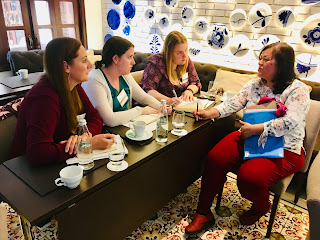 We
spent an incredible morning with a group of Colombian educators who helped us
explore our essential questions. It was very interesting to hear my team
member´s questions and to learn from the panel. The panel consisted of Kevin
Jesus Sierra Carmona (English teacher at
an urban school), Elizabeth Blanco (school teacher) Deissy Velandia, (Colombia Ministry
of Education), and Adriana Giraldo (Colombia Fulbright Commission). Some of our
teachers asked about special education in Colombia, using technology with students,
parent involvement, why they work in education, and about government support
for the English programs. The varied and often complicated answers made me realize
how similar our countries are. Here in Colombia and in the U.S. we all want the
best for our students and are working hard given the resources provided to help
our students be successful. Here are 5 interesting things I learned today:
We
spent an incredible morning with a group of Colombian educators who helped us
explore our essential questions. It was very interesting to hear my team
member´s questions and to learn from the panel. The panel consisted of Kevin
Jesus Sierra Carmona (English teacher at
an urban school), Elizabeth Blanco (school teacher) Deissy Velandia, (Colombia Ministry
of Education), and Adriana Giraldo (Colombia Fulbright Commission). Some of our
teachers asked about special education in Colombia, using technology with students,
parent involvement, why they work in education, and about government support
for the English programs. The varied and often complicated answers made me realize
how similar our countries are. Here in Colombia and in the U.S. we all want the
best for our students and are working hard given the resources provided to help
our students be successful. Here are 5 interesting things I learned today:
1.) There are more than 65 languages across Colombia. While the government
has a goal for increasing the English proficiency of students beyond a level A1
or A2, steps are being taken to preserve native languages as well. Teachers
realize that English is the third language for some of their students after
their native language and then Spanish.
2.) Schools have the autonomy to decide how to teach the standards and there
is not a national curriculum. There are, however, resources provided for the
teachers to help with instruction.
3.) A law was created three years ago that puts students with special needs
in the mainstream classroom. The Colombian teachers we spoke with would like more training on how to best serve students with special needs.
4.) Teachers are teachers wherever you go- Elizabeth made a point to talk about the questions she asks herself before she plans her lessons: What do my students need to learn? How can I teach my students what they need to learn? How can I make my students better? How can I make my teaching better? This set of questions made me recall the entire National Board Teacher Certification process. This are just good questions.
5.) Colombian schools are trying their best to work with the new students moving to Colombia from Venezuela. Some of the concerns that the teachers have for the students is that some have experienced trauma and have missed years of school. They are doing their best to help the students catch up academically and some schools have counseling resources to help with the students´emotional needs.
No comments:
Post a Comment